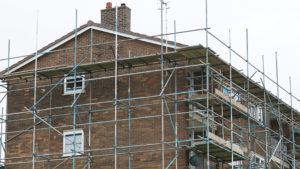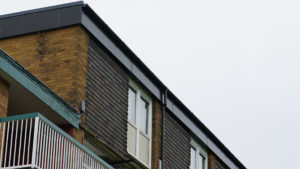
Sheffield City Council is in the midst of a major housing reroofing project, the biggest in its history, which includes the installation of a bespoke solution for the rainwater guttering, downpipes, soffit and fascias. Claire Clutten finds out more.
Sheffield is an incredibly green city, with a multitude of parks, woodlands and gardens — 61% of the entire area is green space, whilst a third of the city lies within the Peak District National Park. When I visited in June, I got an appreciation of just how green the city is when we stopped to look at properties undergoing refurbishment on a large housing estate flanking a steep sided valley, with open fields and woods, and far reaching views across to the Peak District, barely 10 minutes by car from the city centre.
Having installed insulation in the wall and roof spaces, as well as cavity fill in all the traditional properties, and recently completing Decent Homes, Sheffield City Council decided to tackle the external aspects of the properties, areas not covered under the scope of the DHS.
There are a number of compelling reasons why the council chose roofing and roofline in particular, one of which was a desire to reduce costly cyclical painting at high level. However, the overriding factor was the sheer number of 1920/30s and even older properties within the council’s portfolio that had simply surpassed their life expectancy in terms of roofing, fascias and soffits.
The reroofing project is part of a wider investment programme targeting social housing across the city over the next five years, valued at £300m and funded through the council’s General Housing Revenue Account. The reroofing project is split into two main areas — pitched and flat roofing. Chris Lake, assistant manager of the council’s asset management team and lead officer for the roofing project, comments: “The project covers 26,000 properties, 12,000 of which will have roof and roofline installed and the remainder new roofs.”
The pitched roofing is a five-year project, which began late 2014. The flat roofing work is due to finish next March and started in 2013.
Resident participation
The council engaged with members of Sheffield Tenants and Residents Association from an early stage. Said Chris: “On this project, all our roofing material’s have gone through a tenant evaluation process. We held a tenants show where residents had the opportunity to look at the different products available and put forward their ideas on what they thought looked good. Residents also got to see completed roofs on trial properties.”
Chris continued: “When we shortlisted for the contractors, tenants got to see their quality submissions. They scored the answers the contractors gave to our questions, and a lot of the questions were relevant to them, for example how are you going to deal with tenants, how are you going to maintain all the scaffolding on the properties etc.”
Kier, Keepmoat, SBS and Baas are the four contractors involved on the project, all selected through a competitive tender process. Kier currently also provides the council’s repairs and maintenance services. The aluminium rainwater guttering, downpipes, soffits and fascias specified for the project are from Marley Alutec.
Overcoming challenges
On a project of this size and scale, involving older properties, challenges will undoubtedly arise. One such example concerned the depth of the fascias on the maisonettes; another was the lack of rainwater drainage on longer buildings.
 Tony Wereszczynski, technical director at Marley Alutec, offered a further example: “We were asked by Sheffield City Council if we could solve a problem to do with cold bridging on ring beams on the flat roofs with our Evoke soffit and fascia system. Our technical department, working with the council’s asset management team, was able to develop a bespoke solution.”
Tony Wereszczynski, technical director at Marley Alutec, offered a further example: “We were asked by Sheffield City Council if we could solve a problem to do with cold bridging on ring beams on the flat roofs with our Evoke soffit and fascia system. Our technical department, working with the council’s asset management team, was able to develop a bespoke solution.”
The Evoke fascia and soffit range is manufactured from a recycled polyethylene core with an aluminium outer layer, making it extremely light and very strong — despite being only 4mm thick. The range features a nano self-cleaning coating, which means it will continue to look its best for many years, an important consideration for councils like Sheffield, who are looking to reduce ongoing maintenance costs.
Tony added: “We can also save a lot of time by providing the exact sizes of materials contractors need, which negates them having to cut anything on site, thus speeding up the installation process.”
Kier is responsible for approximately half of the pitched roofing contract, as well as a separate smaller contract covering Low Edges, including the properties with deep fascias. For them, the biggest challenges concerned the vast range of property archetypes on the project and the 80 plus roof plan types, as well as the big demand that exists for labour — roofing contractors and subcontractors.
Customer liaison
Keith Naylor, operations manager at Kier said: “Prior notification letters of when we’re going onto the estates are sent out to residents, followed by another letter 21 days prior to the start date and a final letter seven days before work is due to begin.
“It’s quite a challenge on the estate because there are a lot of owner-occupier properties that adjoin council properties, so there is a Party Wall legal process to go through. There is also a section 20 notice process for leaseholders in blocks, which is quite an involved process. Chris’s project team and our site teams work closely together to deal with both processes.”
A potentially problematic issue for the council, particularly on larger-scale projects, can arise from the leaseholders living in blocks where the work is scheduled to take place. Most of the leaseholders appreciate the work needs to be done and are happy with the results, but having to pay for their share of the work can be a sticking point. Cost is a major factor. Sheffield City Council’s dedicated leasehold team addresses these issues when challenged on cost.
Before site work commenced, client liaison advisors carried out tenant inductions covering health and safety and other key messages. Kier’s CLAs speak with local residents on a daily basis and work hard to ensure disruption levels are kept to a minimum. This comes down to the pre-programming and pre-planning stages, where the partners established a methodical, sequence of work route through the estates to reduce traffic disruption, an important factor given the tight residential roads. No mean feat on this project considering the ongoing £2bn road-relaying project underway, delivered by Amey, which began in 2012 and involves over 4,000 roads across the city. Daily clean ups are also carried out to minimise debris.
Bespoke solutions
The guttering, downpipe, soffit and fascia solutions specified from Marley Alutec are being installed on three-storey and above properties, due to their life cycle benefits — the guarantee is 30 years, however the council expects them to last much longer, around 50 years plus. The Evolve range offers a sustainable option, as it is fully recyclable and it is virtually maintenance-free too.
 The products are tailored to meet the requirements of this project, something Tony believes is important: “We are a technically led company, we enjoy being called out on site to resolve problems. When local authorities are upgrading old housing stock and you’ve got to find a solution for the problems they have, it is far better to bespoke find a solution than try to utilise a standard product and make it fit, particularly on large-scale projects.
The products are tailored to meet the requirements of this project, something Tony believes is important: “We are a technically led company, we enjoy being called out on site to resolve problems. When local authorities are upgrading old housing stock and you’ve got to find a solution for the problems they have, it is far better to bespoke find a solution than try to utilise a standard product and make it fit, particularly on large-scale projects.
“We are increasingly being asked to provide bespoke solutions, on new-build because that is the way we can provide best value, but even more so on existing buildings, where you’ve got complicated issues to deal with, like the flat roofing work at Sheffield, which was flummoxing everybody, but we inspired the idea and everybody worked together to find a finished product.”
Keith added: “The scale and variety of this project, where we are working on circa 80 plus differing roof plan types, has demanded a close, collaborative approach from all parties. Working with Marley Alutec has been a positive experience and its technical team has been very helpful on a number of occasions.”
Tony said: “We are proud to be involved in such a significant project and have welcomed the opportunity to work with Sheffield City Council and the main contractors.”
 The £300m investment programme, due to complete in 2019, highlights Sheffield City Council’s on-going commitment to continually improving the quality of housing for residents. In addition to roofing and roofline remodelling works, the five-year programme will see 26,000 properties benefit from the installation of external cladding, new kitchens and bathrooms, windows and doors, as well as heating systems. Communal areas in flats and maisonettes will also be tackled.
The £300m investment programme, due to complete in 2019, highlights Sheffield City Council’s on-going commitment to continually improving the quality of housing for residents. In addition to roofing and roofline remodelling works, the five-year programme will see 26,000 properties benefit from the installation of external cladding, new kitchens and bathrooms, windows and doors, as well as heating systems. Communal areas in flats and maisonettes will also be tackled.
Janet Sharpe, director of housing and neighbourhoods service at Sheffield City Council, concluded: “Our priority is making sure we continue to improve the quality of homes for tenants and create as many local jobs and apprenticeships as possible through our contractors and their supply chains. This will make sure the Sheffield pound spent helps with the economic regeneration of our local neighbourhoods.
“We need to attract the best contractors and suppliers to deliver the work, who will provide high quality solutions to fit our needs for the long-term. We’re pleased to be working with Marley Alutec and are looking forward to seeing the end results.”








